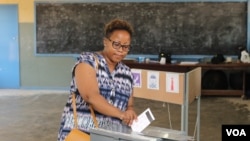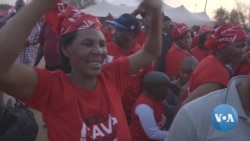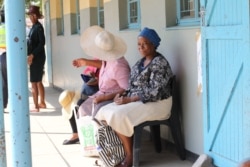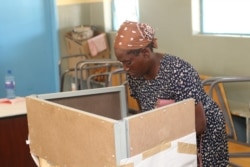Female under-representation in politics continues to be a problem in Botswana, where only three women won seats in the 57-member National Assembly during last week’s general elections. Activists say the central African country has a bias against women both in its electoral system and its culture.
After the 2014 general election, Botswana only had four elected female Members of Parliament in the National Assembly. The number dwindled to three after the October 23 national poll.
WATCH: Botswana Battles Declining Number of Women in Politics
Onneetse Makhumalo of the women’s rights group Gender Links’ blames an electoral system, which she says discriminates against women.
“We live in a very patriarchal society, a society that intentionally or unintentionally we teach people that a male person is a better leader than a female person,” she said. “So we have a lot of women, even those who are capable, at times doubting themselves was to whether they can do it.”
Currently only 5% of women in Botswana hold political positions, far from the 30 percent goal set by the regional bloc, the Southern African Development Community.
Men hold the vast majority of political seats, even though 55 percent of Botswana’s voters are women.
A study by the women’s rights group, Emang Basadi found that the electoral system does not favor women, who also face cultural barriers.
“In politics, we are talking power relations, women would rather give way to men and than stay behind the men. Praise the men, ululate, fund raise for the men, but come to think of it, they can also do the same for themselves,” said Segametsi Modisaotsile of Emang Basadi.
Three African observer missions expressed concern about the low number of female candidates in Botswana’s latest poll. Sibusiso Moyo, who headed the SADC Electoral Observation Mission, says the situation is not ideal.
“The 2019 election represents a downward shift in the representation of women in political leadership, particularly at the National Assembly level,” said Sibusiso Moyo, SADC Observer Mission.
In response, President Mokgweetsi Masisi has promised to appoint more women to the National Assembly through a constitutional proviso, which empowers him do so.
“Unfortunately, very few women that we were able to put forward, but thankfully the constitutional provisions that allow for the election of special members of parliament, will be heavily skewed towards the women folk,” Masisi said.
President Masisi will be sworn in for a fresh five-year term in Gaborone November 1 and appoint six additional members to the National Assembly.














